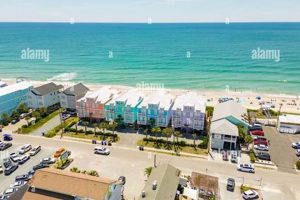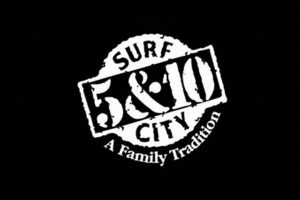Retail establishments located within the geographic boundaries of Surf City, North Carolina, provide goods and services to residents and visitors. These businesses encompass a range of offerings, from necessities to specialized merchandise catering to the coastal lifestyle and tourist trade. They serve as commercial hubs within the community.
These establishments contribute significantly to the local economy, generating revenue through sales and property taxes and providing employment opportunities for area residents. Historically, commercial activity in the area has been tied to fishing, agriculture, and increasingly, tourism. The evolution of these businesses reflects the town’s changing demographics and economic landscape, transitioning from a primarily local economy to one increasingly reliant on seasonal tourism.
The following sections will detail the types of retail outlets present, their impact on the local economy, and considerations for consumers and business owners in the area.
The following guidance aims to assist consumers and prospective business owners in making informed decisions related to retail activity within Surf City, North Carolina.
Tip 1: Conduct Thorough Research: Prior to establishing or patronizing a business, examine available options. Consider online reviews, local business directories, and comparative pricing analyses to gauge value and quality. For potential business ventures, demographic studies and market analyses are crucial.
Tip 2: Prioritize Local Businesses: Supporting local retailers strengthens the community’s economic base. Local businesses often contribute to local charities, sponsor community events, and provide personalized service. Investing locally fosters sustainable growth.
Tip 3: Understand Seasonal Fluctuations: Retail activity in Surf City experiences significant seasonal variations due to tourism. Business owners must plan inventory and staffing levels accordingly. Consumers should anticipate potential price increases during peak seasons.
Tip 4: Explore Diverse Product Offerings: Surf City retail includes a range of establishments, from surf shops and souvenir vendors to grocery stores and essential service providers. Evaluate needs carefully and explore the breadth of available options to find the best fit.
Tip 5: Be Aware of Local Regulations: Business owners must comply with all relevant local, state, and federal regulations, including zoning ordinances, tax requirements, and licensing procedures. Consumers should be aware of rules related to parking, beach access, and noise levels near retail establishments.
Tip 6: Consider Accessibility: Assess the accessibility of retail locations, particularly for individuals with disabilities. Ensure compliance with ADA standards and provide assistance as needed. Accessible business practices enhance customer satisfaction and inclusivity.
By adhering to these guidelines, consumers can make informed purchasing decisions, and business owners can operate effectively within the Surf City retail environment, contributing to a thriving local economy.
The article will now transition to a discussion of specific retail categories and their impact on the overall community.
1. Local Economy
The retail sector within Surf City, North Carolina, functions as a primary driver of the local economy. Commercial establishments generate revenue through sales, contributing directly to the town’s tax base. These tax revenues support essential public services, including infrastructure maintenance, law enforcement, and educational programs. A robust retail environment also stimulates job creation, providing employment opportunities for residents across various skill levels. Furthermore, the presence of diverse retail options attracts both residents and tourists, fostering economic activity and enhancing the overall appeal of the area as a place to live and visit. For example, a thriving local surf shop not only sells goods but also hires local instructors, stimulating both retail sales and service-based income within the community.
The interconnectedness extends beyond direct financial contributions. Local retailers often source goods and services from other local businesses, creating a multiplier effect that amplifies the economic impact. This interdependence strengthens the overall business ecosystem and promotes local entrepreneurship. A hardware store sourcing lumber from a local sawmill exemplifies this interconnectedness, supporting both the retail sector and the local manufacturing industry. Failure of retail establishments, conversely, can lead to decreased property values, reduced tax revenue, and increased unemployment, highlighting the sector’s critical role in maintaining economic stability.
In summary, the retail landscape in Surf City is not merely a collection of shops but a fundamental pillar of the local economy. Its contribution extends from direct revenue generation and job creation to fostering a vibrant business ecosystem and supporting essential public services. Understanding this connection is paramount for policymakers, business owners, and residents alike, as it informs decisions related to economic development, urban planning, and community investment. Maintaining a healthy and diverse retail sector is essential for the long-term economic well-being of Surf City, NC.
2. Tourism Dependency
The commercial viability of retail establishments in Surf City, North Carolina, exhibits a pronounced dependency on tourism, directly correlating to seasonal fluctuations in visitor volume and subsequent consumer spending. This reliance shapes the retail landscape, influencing inventory management, pricing strategies, and overall business sustainability.
- Seasonal Inventory Adjustments
The cyclical nature of tourism necessitates frequent adjustments to inventory levels. During peak seasons, such as summer months and holidays, retailers must stock higher quantities of goods, including beach accessories, souvenirs, and groceries. Conversely, during the off-season, inventory is significantly reduced to minimize storage costs and prevent obsolescence. Miscalculations in inventory management can lead to lost sales during peak periods or excessive carrying costs during slower months, impacting profitability.
- Price Elasticity and Demand
Pricing strategies are influenced by the elasticity of demand, which varies with the influx of tourists. During high-demand periods, retailers may implement surge pricing, capitalizing on increased willingness to pay. However, excessive price gouging can damage reputation and alienate local residents. Balancing profitability with customer perception is crucial for long-term success. Additionally, local residents may adjust their shopping habits to avoid peak tourist times to find better prices and avoid crowds.
- Employment Dynamics
The tourism-driven retail sector relies heavily on seasonal labor. Businesses often hire temporary staff to meet the demands of increased customer traffic during peak seasons. This can create employment opportunities but also presents challenges in recruitment, training, and workforce management. Furthermore, the transient nature of seasonal employment can impact employee retention and overall service quality, affecting customer satisfaction. Training becomes difficult and expensive with constant turn over.
- Impact on Local Businesses
While tourism provides economic benefits, it can also pose challenges for local businesses. Large chain retailers may have a competitive advantage due to economies of scale and brand recognition, potentially displacing smaller, locally-owned establishments. Maintaining a balance between catering to tourists and serving the needs of local residents is essential for preserving the unique character of Surf City and fostering a sustainable business environment. Promoting local businesses and unique goods and services will help.
The interconnectedness of tourism dependency and retail viability is evident in Surf City. The strategies employed by retail businesses to navigate seasonal variations, manage pricing, and adapt to fluctuating employment demands directly impact their long-term sustainability and contribution to the local economy. Further research and policy considerations should focus on mitigating the negative impacts of tourism dependency while maximizing its economic benefits for the community.
3. Seasonal Variation
The cyclical nature of tourism in Surf City, North Carolina, introduces significant seasonal variation in the operational dynamics and economic performance of local retail establishments. This fluctuation necessitates strategic adaptations in inventory management, staffing, and marketing to align with shifts in consumer demand and visitor volume.
- Inventory Management and Stock Levels
Retailers must meticulously adjust inventory levels to accommodate seasonal demand spikes. During peak tourist seasons (summer), stores require substantial stock of beach-related goods, souvenirs, and convenience items. Conversely, off-season demands a reduction in inventory to minimize storage costs and prevent spoilage of perishable goods. Inaccurate forecasting of seasonal demands can lead to lost sales opportunities or excessive holding costs. Example: A surf shop stocking up on surfboards, beachwear, and sunscreen in anticipation of the summer influx.
- Staffing and Employment Needs
Retail staffing levels fluctuate in direct correlation with seasonal tourism patterns. Peak season necessitates hiring additional personnel to manage increased customer traffic and maintain service standards. Off-season experiences workforce reduction to minimize operational expenses. Balancing staffing levels to match fluctuating demand is crucial for optimizing labor costs and maintaining customer service. Example: Hiring temporary cashiers and stock clerks during the summer to handle increased customer volume.
- Pricing Strategies and Promotions
Retail pricing strategies are often adjusted to reflect seasonal demand variations. During peak season, increased demand may support higher prices on certain items. Off-season may require promotional offers and discounts to stimulate sales and clear out excess inventory. Adapting pricing to seasonal trends is crucial for maximizing revenue and managing inventory effectively. Example: Offering discounts on winter clothing and holiday decorations during the off-season to boost sales.
- Marketing and Advertising Campaigns
Retail marketing campaigns are frequently tailored to target seasonal customer segments. Peak season marketing efforts focus on attracting tourists with promotions and advertisements showcasing beach-related products and services. Off-season strategies may target local residents with discounts and promotions designed to encourage year-round patronage. Example: Advertising “Back to School” sales and promotions during late summer to attract local families.
These seasonal variations present both opportunities and challenges for retail businesses in Surf City. Successful navigation of these fluctuations requires careful planning, adaptable strategies, and a deep understanding of the local market dynamics. Effective management of inventory, staffing, pricing, and marketing is essential for optimizing profitability and ensuring long-term sustainability within a tourism-dependent economy.
4. Retail Variety
Retail variety within Surf City, North Carolina, is a crucial component of the local business environment. The presence of diverse retail offerings is not merely a convenience for residents and tourists; it significantly impacts economic resilience, community character, and overall attractiveness of the area. A limited retail landscape restricts consumer choice, reduces economic dynamism, and potentially diminishes the town’s appeal as a destination. Conversely, a robust array of businesses catering to different needs and preferences fosters a more vibrant and sustainable local economy.
Consider, for instance, the difference between a Surf City solely dependent on surf shops and souvenir vendors and one that also includes grocery stores, hardware stores, pharmacies, clothing boutiques, and restaurants. The former is inherently vulnerable to fluctuations in tourism and specific market trends. A decline in surfing popularity or adverse weather conditions could severely impact these businesses. However, a more diverse retail sector provides a buffer against such volatility. Even if tourism declines, local residents still require groceries, medications, and other necessities, providing a more stable revenue base for these businesses. The presence of diverse businesses strengthens the overall economic foundations.
The importance of retail diversity extends beyond economic considerations. A varied retail landscape contributes to the unique character of Surf City, NC. Locally-owned boutiques, art galleries, and specialty food stores add distinctiveness that cannot be replicated by generic chain stores. These businesses reflect the community’s values, tastes, and artistic inclinations, enhancing the overall quality of life for residents and attracting visitors seeking authentic experiences. Ultimately, a balanced and diverse retail ecosystem is essential for the economic vitality, community identity, and long-term sustainability of Surf City, NC.
5. Community Impact
Retail establishments in Surf City, North Carolina, exert a multifaceted influence on the local community, extending beyond mere commercial transactions. The presence and operations of these businesses significantly affect the economic stability, social fabric, and environmental sustainability of the area. The types of establishments, their employment practices, and their engagement with local initiatives collectively shape the community’s character and well-being. For instance, a locally-owned bookstore not only provides access to literature but also fosters a sense of community through book clubs and author events, thereby enriching the cultural landscape.
The economic impact is particularly noteworthy. Retail businesses contribute to the local tax base, which supports public services such as schools, infrastructure maintenance, and emergency response. Furthermore, they generate employment opportunities for residents, ranging from entry-level positions to managerial roles. The spending patterns of these businesses also influence the financial health of other sectors, such as wholesale suppliers and service providers. A grocery store sourcing produce from local farms exemplifies this interconnectedness, benefiting both the retail sector and the agricultural community. However, the closure of a major retailer can lead to job losses, reduced tax revenue, and a decline in consumer spending, underscoring the vulnerability of the community to fluctuations in the retail landscape. Moreover, businesses committed to environmental responsibility, such as reducing waste or utilizing sustainable energy sources, contribute positively to the community’s ecological health and promote responsible consumption patterns.
In summation, the impact of retail businesses on the Surf City community is profound and multifaceted. These establishments serve as economic engines, social hubs, and environmental stewards, shaping the town’s identity and quality of life. A comprehensive understanding of this interconnectedness is crucial for policymakers, business owners, and residents alike, as it informs decisions related to economic development, urban planning, and community engagement. Prioritizing policies that support local businesses, promote sustainable practices, and foster community involvement is essential for ensuring the long-term prosperity and well-being of Surf City, NC.
6. Economic Growth
The retail sector in Surf City, North Carolina, represented by its stores, functions as a measurable indicator and active participant in the town’s overall economic growth. The presence, performance, and evolution of these establishments directly correlate with broader economic trends and contribute significantly to the financial well-being of the community.
- Job Creation and Employment Rates
Retail establishments are primary sources of employment, offering diverse opportunities ranging from entry-level positions to management roles. An expansion of the retail sector often signals economic growth, as new businesses create jobs and reduce unemployment rates. Conversely, store closures can negatively impact local employment figures. The number of retail employees and their wages directly influence the town’s overall income levels and purchasing power.
- Tax Revenue Generation
Sales taxes collected by retail stores constitute a significant portion of local government revenue. Increased retail sales translate directly into higher tax revenue, which funds public services such as infrastructure maintenance, education, and public safety. A thriving retail environment supports these essential services and contributes to the overall quality of life for residents.
- Attraction of Investment and Development
A strong retail sector attracts both domestic and foreign investment, encouraging further economic development in the area. The presence of successful stores signals a healthy consumer market and encourages other businesses to establish a presence in the town. This creates a positive feedback loop, where economic growth attracts more retail businesses, further stimulating the economy.
- Impact on Property Values
The proximity and quality of retail options can influence property values in Surf City. Areas with a vibrant retail district tend to have higher property values due to increased convenience and attractiveness to potential residents and investors. Conversely, a decline in the retail sector can negatively impact property values, reducing the overall wealth of the community.
The interwoven relationship between economic growth and the retail landscape of Surf City is undeniable. Monitoring retail sales, employment trends, and investment activity provides valuable insights into the overall health of the local economy. Policies that support retail businesses and promote a thriving commercial environment are essential for sustaining and expanding economic growth in Surf City, North Carolina.
Frequently Asked Questions
The following section addresses common inquiries regarding commercial activity in Surf City, North Carolina. The information provided is intended to offer clarity and guidance on various aspects of the retail landscape.
Question 1: What types of businesses are typically found within Surf City?
Surf City’s retail sector includes a mix of businesses catering to both residents and tourists. Common establishments include grocery stores, restaurants, surf shops, souvenir vendors, clothing boutiques, hardware stores, and service providers such as pharmacies and banks.
Question 2: How does tourism impact retail sales in Surf City?
Tourism significantly influences retail sales, leading to substantial seasonal variations. Peak tourist seasons, primarily during summer months, result in increased sales for businesses catering to beachgoers and vacationers. Conversely, off-season sales are generally lower, requiring businesses to adapt inventory and staffing accordingly.
Question 3: Are there local regulations that businesses must adhere to in Surf City?
Yes, businesses operating in Surf City are subject to local regulations, including zoning ordinances, permitting requirements, and tax obligations. Compliance with these regulations is essential for legal operation and can impact factors such as signage, operating hours, and building codes.
Question 4: What is the economic contribution of retail stores to Surf City?
Retail establishments play a crucial role in the Surf City economy, generating revenue through sales taxes, creating employment opportunities for local residents, and attracting both residents and tourists, which fosters economic activity and improves the area’s appeal as a location to live and visit.
Question 5: What can be done to support local businesses in Surf City?
Supporting local businesses involves conscious consumer choices such as prioritizing purchases from locally-owned stores and restaurants. Additionally, participating in community events and advocating for policies that support small business development can further contribute to their success.
Question 6: How does seasonal variation affect employment opportunities within the retail sector?
Seasonal variations in tourism lead to corresponding fluctuations in employment within the retail sector. During peak seasons, businesses often hire temporary staff to manage increased customer traffic. However, these employment opportunities are typically short-term, requiring job seekers to consider the seasonal nature of these positions.
In summary, understanding the dynamics of the retail environment in Surf City, NC, is crucial for both consumers and business owners. Awareness of seasonal trends, local regulations, and the importance of supporting local businesses can contribute to a thriving community.
The next section will focus on future trends and challenges facing the retail sector in Surf City.
The Enduring Role of Retail in Surf City, NC
This examination of stores in Surf City, NC, has highlighted their pivotal role in the local economy, their susceptibility to seasonal tourism, and their impact on community character. The diversity of retail offerings, the challenges of fluctuating employment, and the essential generation of tax revenue have been key points in understanding the commercial landscape of this coastal town.
Sustaining a vibrant and balanced retail environment is a critical task for the future. Continued monitoring of economic trends, support for local businesses, and adaptation to evolving consumer demands are essential for ensuring the continued prosperity and community well-being of Surf City, NC. A commitment to these principles will fortify this vital sector for years to come.


![Best Mini Golf Surf City Fun: [Your City] Guide! Learn to Surf & Skate: A Beginner's Step-by-Step Guide Best Mini Golf Surf City Fun: [Your City] Guide! | Learn to Surf & Skate: A Beginner's Step-by-Step Guide](https://universitysurfandskate.com/wp-content/uploads/2026/01/th-873-300x200.jpg)




